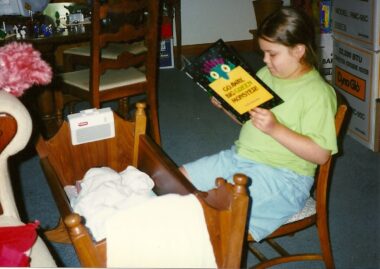Pondering the ‘what ifs’ in life with rare disease
A children's book prompts a difficult reflection on life's circumstances

I spent a small fortune on cute books for the kindergarteners I taught at Brockman School, then a self-contained public school in Columbia, South Carolina. The students, many with severe disabilities, delighted in hearing the animated voices of the stories I read to them.
My own children, Matthew and Katie, were hooked on books almost in the delivery room. Later, after our family had moved to North Carolina, my late mother and I were awarded a Smart Start contract from a state-run program to improve access to early care and education. The contract allowed us to provide music programs to area day cares, and the result was that my collection of endearing books to read — while Mom accompanied on a piano keyboard — exploded.
When our third baby, Jeffrey, was born, Katie read to him faithfully. By the time our schedule had fallen into some sort of routine, our newborn’s diagnosis of SMA crushed anything routine and consumed all the focus I could muster. My reading shifted primarily to emails from fellow SMA families and information about SMA I’d unearthed on the internet.
I didn’t get to read to Jeffrey much myself, but he wasn’t cheated. My folks and others doted on him and chatted to him on a daily basis. The music Mom whipped together after learning he likely wouldn’t be here long was the cherry on top. He loved listening to Nana’s soothing songs as much as he would have enjoyed listening to me read. Maybe even more.

Katie, then 7, reads to her little brother, baby Jeffrey (who’s cozy somewhere underneath the blanket), in May 1997. (Photo by Helen Baldwin)
Grandchildren, books, and the ‘Whatif Monster’
Our granddaughter, Clara, is now 7, the age Katie was when she entertained Jeffrey with her reading and general antics. Clara loves to read, and it shows in her spirited voice.
James, our grandson, is in kindergarten this year. Amid the piles of books he inherited, a favorite new one involves a little green critter. The “Whatif Monster” attempts to dissuade Jonathan James, a curious little boy, from trying anything new. “What if you fall?” “What if they laugh?” “What if you come in last?” the monster asks the boy. Jonathan James eventually has his own questions: “What if I don’t fall or come in last?” “What if they don’t laugh?”
Ahhh … what if.
What if you had to make an incomprehensible choice?
In the 1982 film “Sophie’s Choice” (based on a 1979 book of the same name), a mother (Sophie) waits nervously in line after arrival at a Nazi concentration camp during World War II, her apprehensive young son clinging to her side, her terrified young daughter in her arms. An arrogant officer at the camp approaches and informs her that she may keep only one of the children. Stunned, Sophie begs to keep both, as there’s no way she can choose. He ruthlessly demands she pick one of the children to be taken to the gas chamber or she’ll lose both of them.
Remember those uncomfortable moral dilemma scenarios? If you could only save one, would you save your spouse or your child? If you could save all but one of your children, which one would you leave out? If you could save your child or 100 children, which would you choose? Those “what ifs” remain painfully uncomfortable.
In a frantic quest to avoid losing both of her children, Sophie did make a choice. It doesn’t matter which child she sent with the officer (she chose to give up her daughter), the horrifying decision would understandably haunt her for the rest of her life.
When good news isn’t all good
Tristan and Heather Hay, of Olympia, Washington, have two sons, Liam, 8, and Kellen, 5. Both sons were diagnosed with Duchenne muscular dystrophy (DMD), a disease with a typical life expectancy of 20 to 40 years.
The approval by the U.S. Food and Drug Administration last June of Elevidys (delandistrogene moxeparvovec-rokl), a gene therapy for ambulatory children with DMD, prompted a bittersweet reaction by the Hays.
A treatment is terrific news, right? So what’s not to celebrate?
The answer is that the treatment is currently approved only for children 4 and 5 years old. Therefore, Kellen qualifies and Liam doesn’t.
Unlike Sophie, the Hays may not have handed over one of their children to a Nazi guard and watched while he was carried to his death, but it’s still a gut-wrenching reality. As Heather stated in an interview with King 5 News in Seattle, “How do you explain this to an 8-year-old? Yeah, your brother gets this and you don’t.”
But what if Elevidys had targeted children 8 years and up? Different child, same dilemma.
What if … with respect to our SMA assignment
What if, instead of being handed Jeffrey’s SMA diagnosis, my husband, Randy, and I had to select a devastating set of circumstances for Jeffrey ourselves? Would we have chosen SMA or a different progressive disease, perhaps one that would have allowed a longer life but at the cost of more serious health issues?
Would we have opted for a normal childhood with an unbridled drug addiction in his teen years? What about a wayward path to crime? Would we have chosen to have his life cut short from a tragedy?
What if we’d had the option of having a baby without SMA? What might the hefty price have been then? What if Matthew or Katie had to pay in some way? If that had been the case, then what?
I’m thankful we aren’t the ones in charge.
But what if …
Note: SMA News Today is strictly a news and information website about the disease. It does not provide medical advice, diagnosis, or treatment. This content is not intended to be a substitute for professional medical advice, diagnosis, or treatment. Always seek the advice of your physician or other qualified health provider with any questions you may have regarding a medical condition. Never disregard professional medical advice or delay in seeking it because of something you have read on this website. The opinions expressed in this column are not those of SMA News Today or its parent company, Bionews, and are intended to spark discussion about issues pertaining to spinal muscular atrophy.









Leave a comment
Fill in the required fields to post. Your email address will not be published.